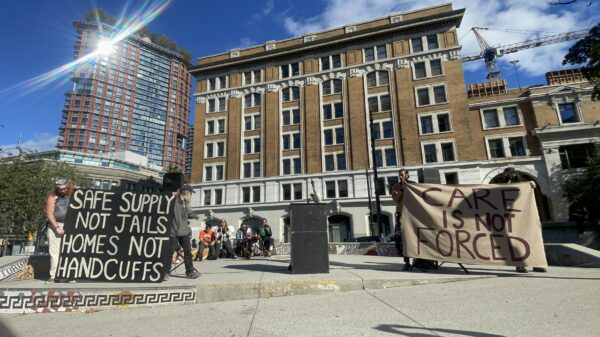This past Saturday British Columbians took to the streets to build public support for social housing and rent control in the lead-up to next spring’s provincial election. At twelve intersections across the City of Vancouver, campaigners held banners and signs, wore red-scarves, and circulated literature describing BC’s affordability crisis and the urgent need for pro-active solutions.
As of yet, there have been no promises made by the major provincial political parties regarding affordable housing construction or rent-control. Saturday’s action, organized by the BC Social Housing Coalition, continues the tradition of “stands for social housing” which were a common sight at intersections across B.C. before the 2009 election.
The campaign is shining a spotlight on the need for new social housing. Before 2001, there was an average of 2,000 units of social housing built in the province each year. But since that time the has number dropped precipitously, creating a sizeable social housing deficit and ballooning wait lists. The coalition is calling for a strong social housing program that can close this deficit, while prioritizing the most vulnerable populations.
The coalition is also issuing a warning about the danger facing existing affordable housing stock. Tens of thousands of non-profit and co-op units are in danger as federal subsidies expire in the coming years. The coalition is proposing a plan to deal with this looming disaster.
Many more homes are in danger of neglect and demolition as gentrification eats away at the affordable housing supply. The coalition is calling for measures to improve and protect this housing through proactive enforcement of “standards of maintenance,” through the legal recognition of tenant unions, and though changes and amendments to the loophole ridden Residential Tenancy Act. The Mainlander has documented several of these loopholes, including the gentrification clause that almost allowed tenants to be evicted in Mount Pleasant and, most recently, the ability of landlords to circumvent rent control laws by removing tenants’ subsidies.
The coalition is arguing that it costs more to allow the housing crisis to continue than it does to address it, noting that British Columbians pay for the lack of affordable housing in several ways, including: inflated rent and mortgage payments, loss of workers who leave the province looking for affordable housing, and services for those who are trapped in cycles of addiction and ill-health caused by homelessness.
The coalition will be launching its comprehensive demands in the coming weeks, and plans to hold “stands” every Saturday from noon-1pm, including next weekend in Kamloops, until the spring provincial election.
















